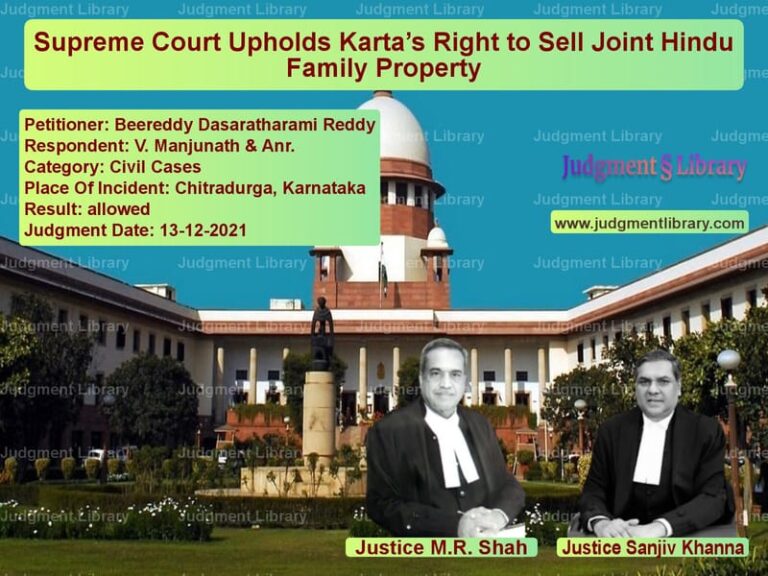Income Tax Deduction on Leave Encashment: Supreme Court Upholds Constitutional Validity
The case of Union of India & Ors. vs. Exide Industries Limited & Anr. revolved around the constitutional validity of clause (f) of Section 43B of the Income Tax Act, 1961. The Supreme Court examined whether this provision, which mandates actual payment for claiming a deduction on leave encashment, was arbitrary and violated Article 14 of the Constitution of India. The Court ultimately upheld the provision, rejecting the arguments against its validity.
Background of the Case
The dispute arose when Exide Industries Limited challenged the validity of Section 43B(f) of the Income Tax Act, inserted by the Finance Act, 2001, with effect from 1st April 2002. This provision required employers to make an actual payment towards leave encashment liability before claiming a tax deduction.
The Calcutta High Court, in its judgment dated 27th June 2007, struck down the provision, holding that it was arbitrary and violative of Article 14 of the Constitution. The Union of India then appealed to the Supreme Court.
Key Legal Issues
- Was clause (f) of Section 43B constitutionally valid?
- Did the provision create an unreasonable distinction between different types of business liabilities?
- Did it violate the fundamental right to equality under Article 14?
Petitioner’s Arguments (Union of India & Ors.)
- The government argued that clause (f) was inserted to prevent tax evasion and ensure that deductions were claimed only against actual payments.
- It contended that employers could misuse provisions allowing deductions for accrued liabilities without disbursing them to employees.
- The provision was necessary to maintain fiscal discipline and prevent undue benefits to businesses.
- The government further asserted that leave encashment is not a statutory liability but a contractual obligation between employer and employee.
Respondent’s Arguments (Exide Industries Limited & Anr.)
- The respondents contended that Section 43B applied to statutory liabilities like tax and provident fund payments, while leave encashment was a business expense.
- They argued that under the mercantile system of accounting, deductions should be allowed when the liability accrued, not when paid.
- The provision effectively forced companies to follow a cash accounting system for leave encashment, which was discriminatory.
- They relied on the Supreme Court’s ruling in Bharat Earth Movers vs. Commissioner of Income Tax, which held that leave encashment liabilities should be deductible in the year they accrue.
Supreme Court’s Observations
The Supreme Court analyzed whether clause (f) of Section 43B was constitutionally valid and necessary for preventing misuse. The Court noted:
- The provision was introduced to prevent companies from claiming deductions without actually disbursing the money.
- There was no constitutional requirement that all business expenses be treated equally for tax purposes.
- The classification made by the legislature was reasonable, as it sought to curb tax evasion.
- The Court rejected the argument that the provision violated Article 14, as tax laws often impose different conditions for different types of deductions.
The Court remarked, “It is within the legislature’s authority to regulate tax deductions to ensure that liabilities are not deferred indefinitely, creating an artificial reduction in taxable income.”
Final Judgment
The Supreme Court upheld the validity of Section 43B(f) and reversed the Calcutta High Court’s decision:
- Clause (f) of Section 43B was held to be constitutionally valid.
- The provision did not violate Article 14 as it served a legitimate fiscal purpose.
- Employers must make actual payments to claim deductions on leave encashment.
Implications of the Judgment
The ruling has significant implications for corporate taxation:
- Businesses must ensure they make actual payments for leave encashment to claim deductions.
- It prevents companies from manipulating profits by claiming unpaid liabilities as deductions.
- It reinforces the government’s power to impose reasonable conditions on tax deductions.
This judgment underscores the principle that tax laws must be interpreted in a manner that prevents abuse while ensuring compliance with constitutional principles.
Petitioner Name: Union of India & Ors..Respondent Name: Exide Industries Limited & Anr..Judgment By: Justice A.M. Khanwilkar, Justice Hemant Gupta, Justice Dinesh Maheshwari.Place Of Incident: India.Judgment Date: 24-04-2020.
Don’t miss out on the full details! Download the complete judgment in PDF format below and gain valuable insights instantly!
Download Judgment: Union of India & Ors vs Exide Industries Lim Supreme Court of India Judgment Dated 24-04-2020.pdf
Direct Downlaod Judgment: Direct downlaod this Judgment
See all petitions in Income Tax Disputes
See all petitions in Tax Evasion Cases
See all petitions in Banking Regulations
See all petitions in Judgment by A M Khanwilkar
See all petitions in Judgment by Hemant Gupta
See all petitions in Judgment by Dinesh Maheshwari
See all petitions in allowed
See all petitions in supreme court of India judgments April 2020
See all petitions in 2020 judgments
See all posts in Taxation and Financial Cases Category
See all allowed petitions in Taxation and Financial Cases Category
See all Dismissed petitions in Taxation and Financial Cases Category
See all partially allowed petitions in Taxation and Financial Cases Category







